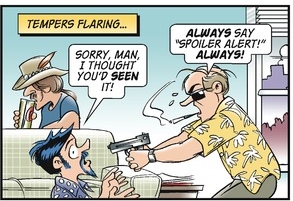Misuse of "Literally"
On TV last week a sportscaster who shall remain nameless said something along the lines of the following: “When they pulled him from the game, he was literally scratching and clawing the floor.”
Yep. The guy was actually digging his finger nails into the basketball court.
You might be willing to give a sportscaster a free pass. Call it a minor variation of the old Woody Allen joke from Annie Hall: “Those who can’t do, teach; those who can’t teach, teach gym.” But yesterday my daughter’s teacher who shall not only remain nameless but whose subject will be withheld to protect his/her identity said, “You are literally shooting yourself in the foot if you don’t study for this exam.”
Now, we all say dumb things sometime. Goodness knows that if compiled all the stupid, erroneous or regretful things I’ve said in my lifetime and shared them on a blog for all to read, I’d be in prison, divorced and friendless. And in this day and age, when so much of what we do is recorded in some fashion, the occasional flub should be forgiven (Dan Quayle’s misspelling of potato back in 1992 caused him endless grief, but heck, for years I was convinced that there was a silent ‘n’ in the word dilemma. Fortunately, I’m not alone in this mistake. Back in grad school my friend Don was convinced about the silent ‘n’ as well, and according to this website, there are thousands among us!).
Flubs are one thing. But when our high school teachers and news broadcasters consistently promulgate an incorrect use of a word (irregardless, anyone?), then we have a bit of a problem.
Or do we?
Martha Gill of The Guardian recently wrote a post about the word literally and cites several instances of the word’s mishandling over the years. It might be of some comfort to learn that the misuse of the word literally has occurred for – literally – centuries. But in the Internet Age, when mistakes are repeated and amplified at the speed of light (figuratively, not literally), it's become so rampant that some dictionaries are officially changing the word's definition.
Gill comes to the conclusion that we should simply avoid the word entirely. She writes: “At the moment (literally) is irredeemable. It is a moot word. We just have to leave it up in its bedroom for a while until it grows up a bit.”
She may be right.
Sure, you can fight the trend and correct your friends when they say things like, "Oh my God! I literally died!" Alternatively, you could opt for a more passive approach:

Or you can simply avoid the word altogether and move on, accepting that language is fluid, confusing and, at times, infuriating. After all, doing otherwise could cause your head to figuratively explode.
